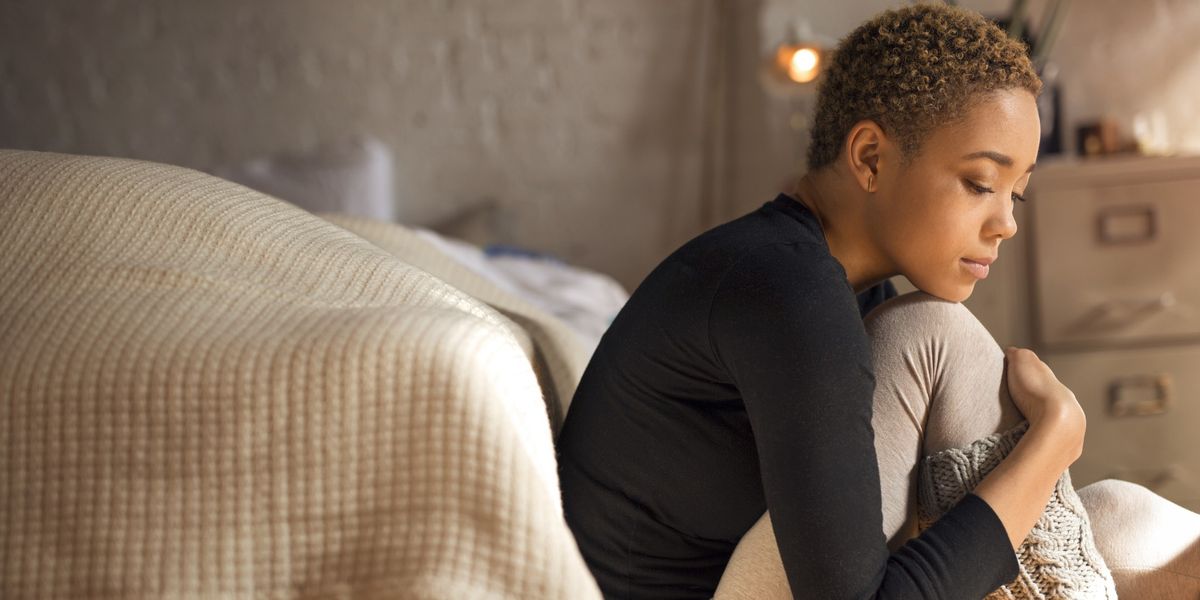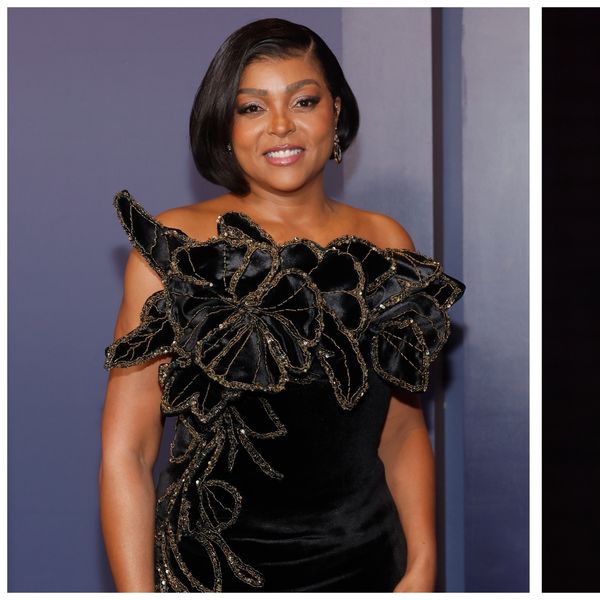
I Found Out I Was Suffering From Genetic Depression. Here's How I Overcame It
“Black people don't go to a psychologist."
That is what I told myself at sixteen when I had thoughts of wanting to sit in my room all day and create master plans disappearing from society.
Six years later, those same words landed me an open spot in the Psychiatric Emergency Services section of Grady Hospital for twenty-four hours, and nobody knew of my whereabouts, but me.
I am in the midst of telling my story, but before I continue, I am going to introduce myself.
My name is Kandice Hill. I am a native of Miami and recent graduate of Florida A&M University. I love matte lipstick, Jermaine Lamarr Cole, boyfriend jeans, giant Polar Pops at Circle K, binge-watching episodes of Power, and just about every thing else that a young woman in her early twenties loves. But there is something slightly different about me that very few people notice from the outside: I suffer from Depression and Anxiety Disorder.
Unlike most people, I did not enjoy my time in grade school. I would go to school, complete my homework, and go to sleep. I was naturally an introvert, and I had no reason to be because I had a loving family and supportive clique of friends and a decent boyfriend.
My mother grew concerned of my excessive sleeping and she set up an appointment for me to see a psychiatrist. There, I found out that I suffered from depression and that it was genetic (my father and paternal grandmother suffered from it too). At the time, I thought that being depressed meant that I was crazy. I thought it was a White thing. I thought I could just go to church and pray about it and it would go away. Naturally and irresponsibly, I decided not to treat my depression. My mother ordered me a prescription of anti-depressants and I would lie about taking them. I went on with my life as if I was never told I had a life changing condition.
I graduated from high school and completed college in expected time. I was just fine. I never experienced a mental episode or anything. I even graduated with honors! But one day while doing an icebreaker during training for my first job, years of not treating my condition finally caught up with me. Out of nowhere, my heart starting beating really fast. I was in a panic, but I did not know why. I was in a new big city teaching high school English to children that I loved dearly. I had new friends. I had an Atlanta boo. I had to ask myself, what is the problem? Why is your heart beating?
I drove myself to the nearest hospital because I was concerned. As I arrived, I was sent to a nurse who had asked me of series of health-related questions. In a matter of minutes, I began to cry. Suddenly, I started hyperventilating and I passed out.
An hour later, I woke up in a bed. I had no idea why I was there. I was a twenty-one year-old recent graduate confined to a room with older people who were yelling and screaming and talking about how they had plans of killing themselves. Later, a nurse came up to me and asked me why I was there. She said I was young, and that I looked out of placed. At that moment I knew I had to make a change in my life. It was clear to me that I did not belong there and if I did not treat my condition, I would be coming back.
I requested that I speak with a licensed social worker that could refer me to psychiatrist to receive medication for my depression. The social worker advised that I return to my hometown and seek treatment there.
I was crushed. I had a job right out of college and that was taken away from me because of my own personal misconceptions about suffering from depression. I went back home as advised, and I spent a month using intense therapy and finding myself.
When I was younger my grandmother would always tell me, “In life you either gonna pay on the front end or you gonna pay on the back end. Just know you gonna always have to pay. So pick one or life will pick it for you."
I was indeed paying on the back end. For a month I had to put my entire life on pause. I had to remove myself from social media, which was contributing to my depression, and really take responsibility for my mental health. During the day, I took my medicine, sat on my front porch, and occasionally volunteered at the neighborhood food bank. Sometimes felt like a failure because deep down I knew my classmates were somewhere posting pictures of their news jobs and children and spouses on the Internet. But at the end of the night, I filled myself up with aspirations to assure me that I was doing the right thing.
Now, I have a job that I love (I'm a Retail Intelligence Agent for New Balance and ThirdChannel). I grew up thinking that medication was for white, crazy people and I missed out on the opportunity of a lifetime.
There are millions of African Americans suffering from depression that aren't even aware of it. Often times the signs are there but we're afraid to admit that it may be more than just a fleeting moment, and instead of getting the help that we need, we wait until it's too late. I hope that after sharing my story, the numbers will decrease and people will see that there's nothing wrong with admitting that you're hurting. What's more important is being able to get the help you need in order to live the life that you dream of.
If you suffer from depression or have overcome it, let me know below! I'd love to hear your story.
Image via Istockphoto/Getty
ItGirl 100 Honors Black Women Who Create Culture & Put On For Their Cities
As they say, create the change you want to see in this world, besties. That’s why xoNecole linked up with Hyundai for the inaugural ItGirl 100 List, a celebration of 100 Genzennial women who aren’t afraid to pull up their own seats to the table. Across regions and industries, these women embody the essence of discovering self-value through purpose, honey! They're fierce, they’re ultra-creative, and we know they make their cities proud.
VIEW THE FULL ITGIRL 100 LIST HERE.
Don’t forget to also check out the ItGirl Directory, featuring 50 Black-woman-owned marketing and branding agencies, photographers and videographers, publicists, and more.
THE ITGIRL MEMO

I. An ItGirl puts on for her city and masters her self-worth through purpose.
II. An ItGirl celebrates all the things that make her unique.
III. An ItGirl empowers others to become the best versions of themselves.
IV. An ItGirl leads by example, inspiring others through her actions and integrity.
V. An ItGirl paves the way for authenticity and diversity in all aspects of life.
VI. An ItGirl uses the power of her voice to advocate for positive change in the world.
Let’s make things inbox official! Sign up for the xoNecole newsletter for daily love, wellness, career, and exclusive content delivered straight to your inbox.
When discussing the topic of raising children, discipline is often the first thing that comes to mind. Children need discipline. Full stop. But what is discipline? And how do we draw the line between discipline and revenge?
The origin of the word "discipline" can be traced back to the Latin word "disciplina," which means "instruction" or "teaching." Over time, however, discipline has come to be synonymous with punishment, with parents relying on shame, fear, and/or physical pain to curb undesirable behavior.
Teaching takes time, so nipping it in the bud in whatever fashion parents deem necessary (within reason) has become the norm. But is this what’s best for children? And when does it become less about curbing undesirable behavior and more about getting our licks back for offenses we feel our children should know better to do?
In my work as a parenting coach, I’ve often heard parents say, “I asked him nicely three times before spanking him. He didn’t stop doing it until I did, so clearly talking doesn’t work.”
And the parent isn’t wrong. Talking often doesn’t work the first, the third, or the even the 10th time. And the reason is directly tied to brain development.
Children cannot and do not process information the way an adult can. Auditory processing is not fully developed until a child is 14 or 15 years old. And even then, if a child has auditory processing delays or Auditory Processing Disorder (APD), they may always struggle with processing auditory commands. According to Susie S. Loraine, MA, CCC-SLP, the term auditory processing refers to how the brain perceives and interprets sound information. Several skills determine auditory processing ability—or listening success. They develop in a general four-step hierarchy, but all work together and are essential for daily listening.
Without this understanding, discipline can easily become revenge because parents will then view their child’s misdeeds as a personal slight. Instead of teaching them to do better, parents now want to show them the consequences of not doing better. This is why it's imperative for parents to discern between discipline and revenge to maintain healthy relationships with their children.
5 WAYS TO DISTINGUISH BETWEEN PARENTAL GUIDANCE AND RETALIATION:
Understanding The Intent
Discipline is rooted in love and concern for the child's well-being. It focuses on teaching lessons and helping children understand the consequences of their actions. Conversely, revenge-driven actions stem from a desire to inflict pain or punishment as payback for perceived slights or disobedience. Parents should reflect on their motives before taking disciplinary actions. Ask yourself whether your intention is to help your child learn or to make them suffer for upsetting you.
Example: If a child accidentally breaks a valuable item, a disciplinary response would involve discussing the importance of being careful and working with the child to come up with a way to replace or fix what they’ve broken. On the other hand, a vengeful reaction might involve yelling, harsh punishment, or bringing up past mistakes to intensify guilt.
Maintaining Emotional Regulation
Effective discipline requires parents to remain calm and composed, even in challenging situations. It's natural to feel upset or frustrated when children misbehave, but responding with anger or resentment can escalate the situation and blur the line between discipline and revenge. Before addressing the issue, take a moment to breathe and collect your thoughts.
Example: If a child cannot follow instructions, a disciplined response would involve calmly explaining why their cooperation is necessary in working with the child to accomplish the goal. Conversely, a retaliatory response might involve shouting, name-calling, or resorting to physical punishment out of anger.
Promoting Growth and Learning
Discipline should always aim to promote growth and learning. It involves guiding children toward making better choices and understanding the impact of their actions on themselves and others. Effective discipline strategies include positive reinforcement, setting clear expectations, and providing opportunities for reflection and growth.
Example: If a child repeatedly forgets to complete their chores, a disciplinary approach would involve discussing the importance of responsibility and finding solutions together, such as creating a chore chart or setting reminders with Siri or Alexa. In contrast, a revenge-driven response might involve imposing overly harsh punishments or belittling the child, which can undermine their self-esteem and hinder their ability to learn from their mistakes.

Momo Productions/Getty
Building Trust and Communication
Trust and open communication are essential components of a healthy parent-child relationship. Discipline should strengthen this bond by fostering trust and encouraging children to confide in their parents without fear of judgment or retaliation. When children feel safe and supported, they're more likely to accept discipline as a form of guidance rather than punishment.
Example: If a child admits to breaking a rule or making a mistake, a disciplined response would involve listening to their perspective, discussing the consequences of their actions, and working together to find a solution. Conversely, a retaliatory response might involve accusations, blame, or shutting down communication, which can erode trust and damage the parent-child relationship.
Seeking Professional Guidance
Parenting is a learning journey, and, disciplining children is a delicate balance between guiding them toward responsible behavior and nurturing their growth. By understanding the intent behind our actions, maintaining emotional regulation, promoting growth and learning, building trust and communication, and seeking professional guidance when needed, as parents we can help our children built on love, respect, and understanding.
Let’s make things inbox official! Sign up for the xoNecole newsletter for love, wellness, career, and exclusive content delivered straight to your inbox.
Featured image by Courtney Hale/Getty Images









